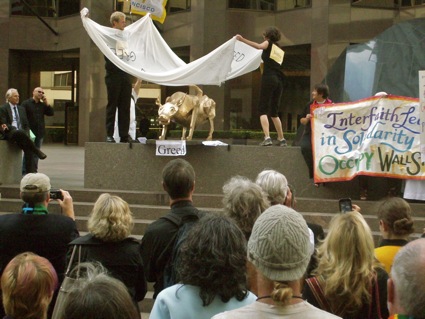We’re in Boston right now visiting family, and to day I read this on the front page of today’s Boston Globe:
When Occupy Boston protesters complain about greedy bankers, corporate jets, and the wealthiest Americans, Henry Hegelson feels as if he is one of the prime targets.
Hegelson, 37, said he is not only in the top 1 percent of American earners, but also founded a financial company and an airplane charter business. He said the protesters don’t seem to care that he built his wealth from scratch….
In that last sentence we see the chasm that lies between the understanding of the occupiers and the wealthy: Hegelson believes that he created all his wealth completely “from scratch,” while the occupiers believe that the financial system is basically rigged in such a way that the vast majority of people simply cannot build their wealth “from scratch.”
I come at it from a third perspective. Theologian Bernard Loomer pointed out the intellectual accomplishments of Jesus of Nazareth, and in particular Loomer’s intellectual conception of the “Kingdom of Heaven,” which Loomer himself prefers to call the “web of life.”
Based on this intellectual conception of the way the world works — that we are all inter-related in a web of life — Jesus pointed out the damaging effects of wealth. Too much wealth cuts you off from other persons, and indeed from all living and non-living things, in destructive ways. If you want to be fully supported by and participating in the Kingdom of Heaven, you must get rid of wealth. Too much wealth leads you to exploit other human beings, other living things, and non-living things — to live counter to the Web of Life.
Thus, when the rich young man comes to Jesus and says that he follows all the rules of religion, wand wants to know what else he must do to have access to the Kingdom of Heaven, Jesus tells him (as translated in the King James Version): “Go thy way, sell whatsoever thou hast, and give to the poor, and thous shat have treasure in heaven.” The rich young man is “sad at that saying,” and wanders off and out of the story.
We never learn if the rich young man in the story actually sold everything he had and gave the proceeds to the poor. But we can be pretty sure that Henry Hegelson has no intention of doing anything of the kind; and so Hegelson has shut himself out of the Kingdom of Heaven. Unlike the rich young man, Hegelson isn’t even “sad at that saying”; he’s just baffled why anyone doesn’t think he is a hero.


